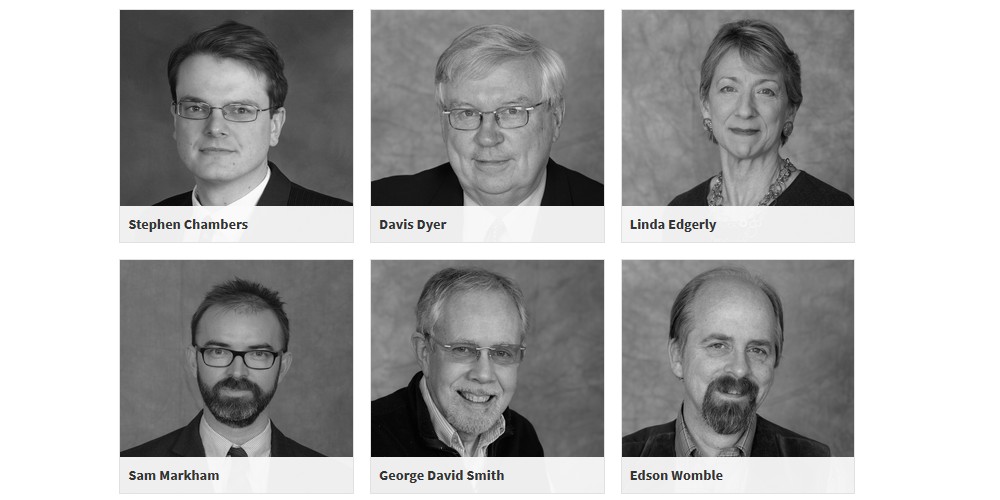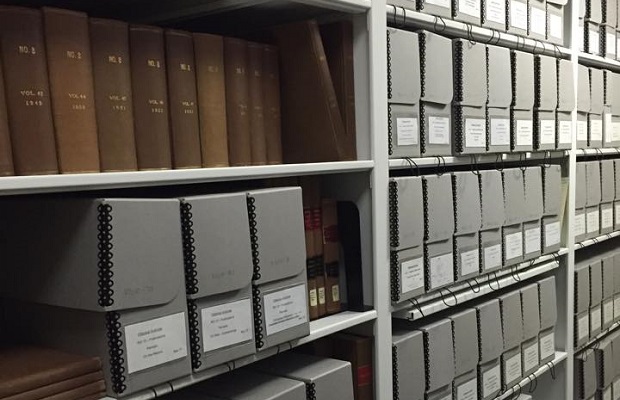Below is our recent interview with Stephen Chambers, Director at The Winthrop Group:

Q: Could you provide our readers with a brief introduction to The Winthrop Group?
A: The Winthrop Group is the world’s leading history and archival services consulting firm. In 1982, Winthrop was founded by Harvard-trained historians on the premise that history is valuable to individuals and organizations in ways that go far beyond what is taught in schools and universities.
Since then, we have worked with more than 350 clients, from private families and individuals to Fortune 500 corporations and leading educational institutions. We have deep experience connecting with high net worth family leaders and top executives across industries. Our work has included diverse projects involving books, articles, films, consulting studies, digital platforms, multimedia presentations, and numerous archival programs around the world. Winthrop has earned a reputation for the highest standards of quality and professionalism, and we have developed an unparalleled network of international advisors, consultants, and partners.
Q: What kinds of services do you provide to your clients?
A: Our work is highly customized for each client and varies, depending on the client’s priorities, target audience, and timetable.
• ARCHIVES. Winthrop plans and helps to manage and staff archives for clients seeking to preserve, control, and provide access to their assets, artifacts, and information. We work with all types of materials, including digital and paper-based documentation, images, and print, as well as physical objects, audio, and video recordings. Our experience with a wide variety of clients truly is second to none.
• PUBLICATIONS. Within the publishing industry, our relationships with leading trade and university press publishers are excellent; we have never failed to place a book manuscript, when our clients have asked us to do so. From distinguished books and articles published by the world’s leading presses and business journals to lavishly illustrated, privately-created books, booklets, and brochures to articles and shorter-form pieces, our work can be tailored to virtually any audience or purpose.
• DOCUMENTARY FILM AND VIDEO. Our award-winning documentaries and other visual presentations combine artful narrative and high production values to establish a personal connection with the audience, creating a powerful and engaging story.
• DIGITAL PLATFORMS. Digital platforms allow organizations and individuals to present their past in ways that are interactive, iterative, and engaging. A dedicated digital hub can facilitate collaboration and experience-sharing by employees, members, and other stakeholders; other dynamic digital interfaces, such as an interactive atlas or timeline, can help users to find purpose in complex historical geographies, as well as past leaders and generations.
• RESEARCH & LITIGATION SUPPORT. By locating, analyzing, and interpreting historical materials, we provide crucial context for litigation, regulatory compliance, economic forecasting, and public relations that can stand up to rigorous expert scrutiny. Our work includes professional historical research, as well as the provision of experienced, expert witnesses in legal matters.
• MASTER NARRATIVE. Although much of our work is created for external audiences, many of our clients also find value in privately understanding their past. One way we do this is by creating what we call a “master narrative”: that is, a substantial, proprietary account of an organization that analyzes and recounts critical developments, as well as the themes, characteristics, and values that have defined its past. As a strategic, internal document, the master narrative serves as a foundation of authentic historical content that can shape a variety of other initiatives (e.g., books, videos, archives, digital hub), strategy, and future decision making.
 Recommended: VidCruiter Delivers Tailored Video Interviewing Solutions To High-Performing Recruitment Teams
Recommended: VidCruiter Delivers Tailored Video Interviewing Solutions To High-Performing Recruitment Teams
Q: What makes your approach unique?
A: We believe that our people and decades of experience make us stand out. Winthrop professionals are recognized experts with a unique array of skills—analytical, interpretive, research, writing, and project management—combined with years of practical experience with clients in business and non-profit sectors. We hold doctorates and other advanced degrees in history, business, law, and related disciplines; many of our directors and principals also hold faculty appointments at leading universities and business schools in the United States and abroad.
Many organizations know that their past is a unique and powerful asset. Yet, when it comes time to start an archives program, recognize a milestone anniversary, or prepare for a leadership transition, organizations are often at a loss of where to begin. We believe that the quality and authenticity of the historical content directly influences how valuable it is likely to be. We bring top experts to each project in a collaborative approach, according to the highest standards of professional historians and archivists, to ensure that our work can have the greatest impact.
Q: You’ve served hundreds of clients over the years; can you name some of them and tell us how exactly you helped them?
A: Since 1982, Winthrop has worked with diverse clients, including multinational corporations, nonprofits, family-owned businesses, foundations, educational institutions, law firms, as well as private families and individuals. While much of our work is private and proprietary, several representative examples illustrate the types of projects we have helped to develop.
• PROCTER & GAMBLE
Procter & Gamble is the quintessential learning organization. For well over a century, the company has cultivated a highly disciplined, intensely analytical approach to doing business, habitually asking what works, what doesn’t, and why. As Ed Artzt, P&G’s former chairman and CEO, put it: “[I]f . . . we become very disciplined in the way we examine our history, learn from it, and extract lessons from it, and then convert those lessons into principles for the future, then we will make far, far fewer mistakes. And our success rate will increase dramatically.”
With this in mind, P&G commissioned Winthrop to research and write a full-scale history of the company, with a focus on the evolution of P&G brands. Rising Tide: Lessons from 165 Years of Brand Building at Procter & Gamble (Harvard Business Press) charts the turning points and defining moments in the growth of a marketing powerhouse. It explores key product innovations, like Ivory soap, and explains how P&G developed new marketing techniques to transform everyday household items into iconic brands. “[M]ore than a company history,” Business Horizons described it, “it is, in fact, a lesson book of marketing milestones in consumer products during the 20th century.”
A best-seller in its second printing, the book is used to train new employees, to educate partners and customers in P&G’s 165-year-old culture, and, through video footage, interviews, images, artifacts, and other material we gathered during this project, to support a website focused on the heritage of individual brands.
• FORD MOTOR COMPANY
In 1996, Ford contracted with Winthrop to investigate options for management of its archival materials held in the Industrial Archives (4,000+ cu. ft.), a warehouse in Highland Park, in Company files and at the Research Center of the Henry Ford Museum (5,600+ cu. ft. donated in 1964). A reconnaissance was conducted and a report was prepared which included “best practice” analyses of similar-sized archival repositories. The report led to a complete overhaul of how Ford views the archives.
Two years later, Ford engaged Winthrop to undertake a pilot study on its Global Archives Initiative. This work involved reviewing and analyzing information about records-keeping in two international offices. Ford-Werke in Cologne Germany and Ford Motor Company in Geelong Australia were selected as the sites for the pilot study. Data was gathered about records with archival potential, records-keeping procedures and storage facilities. In addition, Winthrop obtained information about the records typically maintained by business archives, access policies and laws governing business records in the respective countries. The information was used to prepare a series of recommendations relative to management of archival records on a global basis, including coordinating procedures, and securing and regaining intellectual control of the archival records. Ford approved Winthrop’s recommendations and authorized the Ford Archivist to oversee and direct the Global Archives Initiative.
• CLEVELAND CLINIC
“Better care of the sick, investigation into their problems and further education of those who serve:” That was the mission of Cleveland Clinic when it welcomed its first patients back in 1921. Since then, the Clinic has grown into a world-class medical center that provides cutting edge care to over 4.6 million patients per year, while performing outstanding research and education.
In 2007, the Cleveland Clinic was growing still larger through a series of acquisitions. Dr. Delos “Toby” Cosgrove, a renowned heart surgeon and CEO and President of the Clinic, recognized that the institution’s history had profoundly shaped its mission and values. He wanted to ensure that those values were passed on to new employees as well as the wider public they served.
Winthrop set out to create an engaging film that would tell the story of the Clinic and its values as they had evolved over 80-odd years of extraordinary change in medicine and health care. Working with one of our longtime videography partners, we crafted a script that used still photographs, video footage, and other archival material to bring the story to life, along with artful narration and a stirring soundtrack to create an emotional bond with the audience.
The result was “All for One,” a compelling 45-minute film that was broadcast on Cleveland’s local PBS station, with an abbreviated 10-minute version for screening at schools and for community groups. The film earned a 2008 International Silver Telly Award and a 2012 Emmy award for best documentary.
 Recommended: How Chatbots Can Increase Adherence To Treatment
Recommended: How Chatbots Can Increase Adherence To Treatment
Q: What are your plans for the future?
A: Much of our work is dedicated to utilizing the past to help our clients prepare for the future. This means that although we are grounded in history, we are always looking ahead. Today, a growing number of organizations and individuals are finding their history to be increasingly relevant, as a source of unique, authentic content and competitive advantage that simply cannot be replicated. This adds urgency to the analysis and maintenance of their archives. Until a natural disaster or data breach occurs, many people simply do not realize just how fragile their physical and digital materials can be. At Winthrop, we are committed to maintaining top standards in our archival practice and will strive to continue to set the standard in the field well into the future.
In addition, making history relevant will depend on our people. When looking at their past, many organizations and individuals simply do not know where to start. They may not know what they will find in archival documents or oral history interviews, and they may believe (wrongly) that the past is better left unsaid, unanalyzed. For strategic organizations, the future trend will be in the exact opposite direction: these organizations will want professional historians to create an independent account of past decisions, turning points, setbacks, and victories. The unvarnished truth, perhaps initially captured in private (in the form of a Master Narrative, for example), represents a reservoir of meaning. Every organization, whether it is ten years old or celebrating a 200th anniversary, has a past with authentic content that can be used to shape culture and strategy well into the future. This is true of startups, as well, many of which will benefit by documenting the creation of their history in real-time. That said, understanding history in private is often just a first step to shape a variety of initiatives.
At Winthrop, we believe that the written word is alive and well. Although commentators have predicted the demise of the printed book for decades, our work in publishing (both with professional presses and in private printing) is alive and well – and we believe it will continue to grow. Illustrated coffee table style books will continue to coexist alongside rigorous historical analyses and targeted booklets. At the same time, much of the content developed for a master narrative and book can be utilized to create professional historical documentaries and other targeted videos. Videos highlighting aspects of an organization’s experience might be created, for example, for new employee onboarding, internal training, or board member education; other videos can be developed for external-facing websites and even wider public viewing – all of it grounded in authentic, verifiable historical content.
Winthrop has been at the forefront of print and video media for decades, and we believe the future will continue to demand even more from the past in the form of digital offerings. In recent years, we have partnered with cutting-edge technology companies to create dedicated digital hubs and other customized offerings that allow the past to become a living, interactive experience for a variety of stakeholders. These platforms can take many forms: capturing a teams’ work on a specific project to ensure that future employees learn from the initiative during the next iteration; developing a robust environment that celebrates the entire life of an organization for a milestone; creating a rigorous digital family history for rising generations, populated by interactive genealogical markers, maps, and timelines.
As historians and archivists, we know that the future will be different than the past; our work is no exception. We are committed to maintaining the highest professional standards, developing productive partnerships to offer next-generation technology and digital offerings, and helping every client – regardless of their size or ambitions – to realize their goals.
Activate Social Media:


